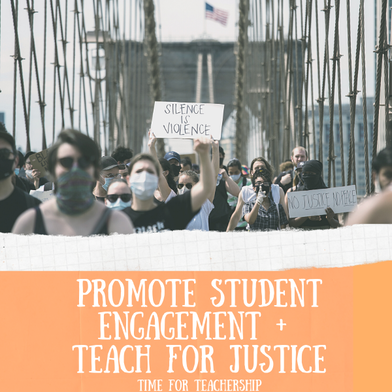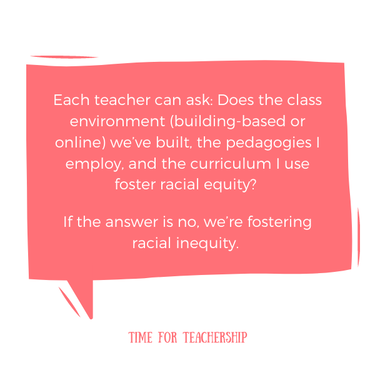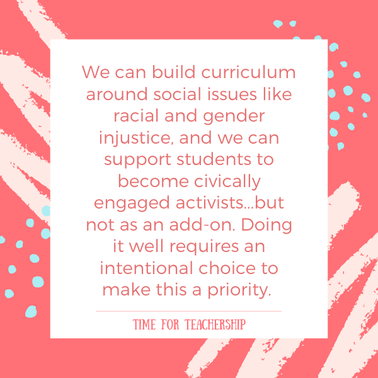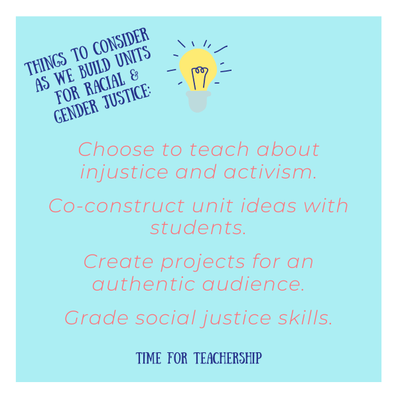|
For approximately the next 30 days, I want to focus on how we create amazing units for our students this year. I think it’s every teacher’s dream to have 100% student engagement in their lessons, and I want to help you achieve that dream. Most educators saw a drop in student engagement this spring during distance learning. Of course, lack of access to devices and WiFi contributed to this, but getting our students online is just the beginning. We’ll also want to consider what kind of supports (e.g., emotional, relational, cultural), pedagogies, and curricula (e.g., content, assessments) will best support our students to be successful this year. As many educators are committing (or have renewed their commitment) to antiracist teaching, these educational pieces—supportive environment, pedagogy, curriculum—can be critically examined with antiracism in mind. Each teacher can ask: Does the class environment (building-based or online) we’ve built, the pedagogies I employ, and the curriculum I use foster racial equity? If the answer is no, we’re fostering racial inequity. Each of these pieces could get their own blog post series, but I’ll quickly address the first two and then address equitable curricula in more depth. Supportive Environment Creating racially equitable environments require an extra effort to help students and families of the global majority (a term I’m starting to use instead of “people of color”) feel a sense of belonging in school. Equity necessitates we offer more support to students who need more support. Equality is offering the same to everyone; equality maintains the status quo. We need equity, not equality. Pedagogy Zaretta Hammond talks about culturally responsive teaching as prioritizing the learning. Kids need to get into the learning pit and grapple. We need to have high expectations for students, and give grade level work even to struggling students because remediation does not work. Of course, we will need to support students with scaffolding as well, but they need exposure to grade level content or else the opportunity gap, which disproportionately hurts Black, Brown, and Indigenous children, will persist. To take stock of your equitable practices, I’m re-sharing the equitable practices inventory—a freebie from Fall 2019. Curriculum Choose to teach about injustice and activism. We have an incredible opportunity to build on our society’s increased attention towards racism in the U.S. and to bring that energy into our classes this fall. The last 4 years of my teaching career, I made the decision to teach all of the Literacy standards my class was supposed to cover through intersectional feminist content. We can build curriculum around social issues like racial and gender injustice, and we can support students to become civically engaged activists. We can do that, but not as an add-on. Doing it well requires an intentional choice to make this a priority. Co-construct unit ideas with students. Once I made a conscious choice to teach for racial and gender justice and built units around current events and issues relevant to my students’ lives, I saw significantly more student engagement. I learned to share ideas for units with my students and ask them for feedback or to tell me what they wanted to learn about. Create projects for an authentic audience. Another key piece to the increased student engagement I saw was having an authentic purpose for summative assessments beyond submitting work to me for a grade. This often meant my students presented their work to an audience beyond the class. Here are some examples of my students’ projects: a live poetry performance and a social justice expo that school staff and students were invited to watch; a product created for purchase, like t-shirts raising awareness of the mistreatment of pregnant women who are incarcerated; documentaries submitted to a national film competition; issue-based circle conversations facilitated with younger grades; a proposal presented to school leadership to change school policy. Knowing their project would be useful to an audience beyond just me and the members of their class was a strong motivator for students to learn as possible to make their project the best it could be. Grade social justice skills. I’ve written a lot about grading lately—I support a mastery-based grading system that provides students specific feedback on where they are in a progression towards mastery for each content standard. What we measure and grade communicates to students what we value, so I recommend incorporating social justice standards into the curricula we build. Teaching Tolerance has an excellent list that’s slightly adapted to fit each grade band. Find inspiration. Finally, if you’re thinking all this sounds great, but how do I get ideas for these amazing units I want to build? I often got my ideas from reading, watching the news, and listening to podcasts. The more I learned, the more I had questions to advance my own learning, and it was these questions that produced the seeds that eventually grew into units. Places where I consistently find sparks of inspiration include the podcasts: Codeswitch, Teaching Hard History, and Queer America. I also love publications like the blog from ReThinking Schools, particularly their posts tagged as curriculum. Also, the PBL Works Youtube Channel has a project videos playlist that’s great for seeing the possibilities of what amazing units could look like. You could also reach out to a local activist organization to help you co-construct a unit. Quick note: you can absolutely create justice-based curricula in any subject area. For example, ReThinking Schools has an entire book published about the intersection of social justice and math. Given the possibility of continued distance learning, this is a critical time for us to invest in student engagement, and we can do so in a way that prioritizes racial justice. We don’t have to choose between addressing COVID or racial justice. They are not mutually exclusive. As we create new curricula, let’s explicitly integrate racial justice work, activism, and civic engagement so our students are both engaged in our lessons and building the skills to be impactful leaders for justice in their lives.
1 Comment
Janine Theiler
7/17/2020 05:20:39 pm
Lindsay, when I click on the "1 hour free masterclass" link, I'm directed to a registration page with the "save my seat" link on it, but the "save my seat" link isn't working. It just redirects me to the exact same page. Am I missing something? THANKS
Reply
Leave a Reply. |
Details
For transcripts of episodes (and the option to search for terms in transcripts), click here!
Time for Teachership is now a proud member of the...AuthorLindsay Lyons (she/her) is an educational justice coach who works with teachers and school leaders to inspire educational innovation for racial and gender justice, design curricula grounded in student voice, and build capacity for shared leadership. Lindsay taught in NYC public schools, holds a PhD in Leadership and Change, and is the founder of the educational blog and podcast, Time for Teachership. Archives
May 2024
Categories |





 RSS Feed
RSS Feed